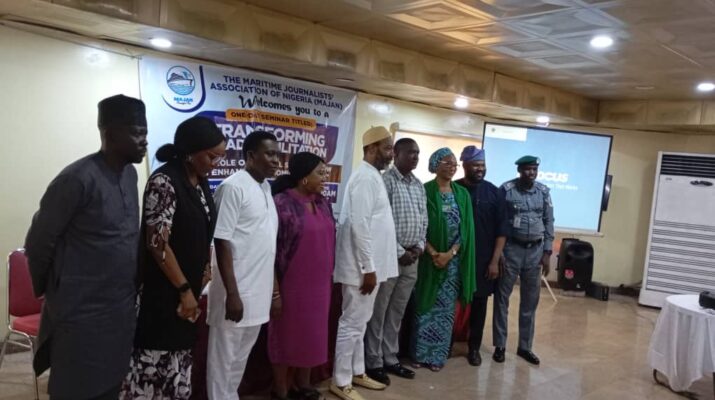With about five years to full implementation of the National Single Window to align with over 164 maritime countries of the world, it is high time Nigeria began implementation and deployment of the NSW scheme to enhance the country’s trade facilitation with its trading partners in Africa and globally, as well as generate more revenue to further grow the country’s economy
By Edu Abade
Although its activation and full deployment has taken longer than anticipated, the National Single Window (NSW) aimed at trade facilitation and unification of revenue collection as directed by President Bola Ahmed Tinubu remains the rave of the moment and the most robust initiative to boost the national economy.
Industry experts who gathered at this year’s edition of the Maritime Journalists’ Association of Nigeria (MAJAN) Summit with the theme: Transforming Trade Facilitation: The Role of National Single Window on Enhancing Economic Efficiency, commended the initiative, maintaining that the NSW Committee must of necessity go back to the drawing if the project must succeed, especially in the light of its alignment with other countries of the world.
In his opening remarks, President of MAJAN, Jerry Aguigbo, pointed out that the success rate of the NSW has been impressive in Singapore’s TradeNet System, which reduced trade processing time from four days to a mere 10 minutes, resulting in significant costs saving, while South Korea’s Single Window System integrated 90 different systems from 43 government agencies, enabling a 60 percent reduction in trade transaction costs and a 40 percent increase in processing speed.
Aguigbo also cited Thailand, which reduced transaction timeline by 24 percent through its NSW; Hong Kong, where the NSW generated substantial economic benefits, resulting in estimated annual savings of HK$1.3 billion; Pakistan, which streamlined 65 percent of regulated trade and reduced the time for declaration of goods by half through its Single Window (PSW) and Sri Lanka, which aims to reduce trade costs, faster processing, enhance government revenue collection and stronger alignment with global standards through its NSW.
He explained that MAJAN carefully chose the seminar theme to fully stress its impact on the Nigerian economy, adding: “The seminar aims to explore the concept of NSW, its objectives and its potential to streamline trade processes while enhancing economic efficiency in Nigeria. Key areas of deliberation will include the goals of the NSW project, stakeholder roles, implementation strategies and its alignment with national and regional trade facilitation initiatives such as the Africa Continental Free Trade Area (AfCFTA).”
Chairman of the event, Dr. Eugene Nweke, who dwelled on the essential roles and responsibilities of the initiative, maintained that the successful implementation and operation of the NSW require collaboration among stakeholders, including government agencies, which are vested with providing regulatory frameworks and technical support.
Others are the private sector, expected to providing expertise and resources and service providers, which should provide technical support and maintenance services.
On the implementation strategies, he said the implementation of the NSW involves several critical steps, including pocess analysis, technology design, deployment and management, as well as technology design and deployment, which ensure developing a user-friendly and secure platform.
“The legal reforms and system integration will ensure compliance with regulatory frameworks and integrating with existing system, while exploring the potentials of the International Cargo Tracking Note (ICTN) remains a critical tool for tracking and monitoring cargo movements, enhancing supply chain visibility and reducing the risk of cargo loss or theft. Its implementation can have significant benefits for the industry, including increased efficiency, reduced costs, and improved security.
“The NSW is a critical infrastructure that can transform trade facilitation in Nigeria, enhancing economic efficiency and competitiveness. Its successful implementation requires collaboration among stakeholders, including government agencies, private sector stakeholders and service providers. By learning from best practices and case studies, we can ensure the effective implementation of the NSW and achieve significant benefits for our economy,” he stated.
In his presentation tilted: Enhancing Transparency and Accountability in Trade: The Role of NSW in Combating Corruption, Registrar, National Association of Government Approved Freight Forwarders (NAGAFF) Academy, Comrade Francis Omotosho, explained that the Single Window concept was adopted under the International Maritime Organisation’s (IMO) Convention of Facilitation of International Maritime Traffic (FAL), WCO International Convention on the Simplification and Harmonization of Customs Procedures (Kyoto Convention) and WTO Trade Facilitation Agreement.
He said the conventions required all government agencies regulating shipping and international trade logistics systems to use a Single Digital Platform to share and exchange information and also permits the traders or transporters to submit or lodge all the data, information and documents needed for determining admissibility of the Ships and Cargoes in a standardized format only once to all the Regulatory Agencies on a Single Digital Portal or Platform.
It is to be controlled by a Central Unified Interface Lead Agency among the agencies and also allows the traders to view all interactions between the regulatory agencies without regard for the internal divisions within the Government Regulatory Agencies; in order to acquire the necessary Documents, Permits, and Clearances for their Shipments.
Omotosho expressed the hope that this will streamline procedures to clear the arrival, stay and departure of ships and swift cargo clearance and greatly enhance the efficiency of ports operations and total logistics and supply chain systems of Nigeria, adding that It was specifically given that by January 1, 2024 all 164 shipping and trading Countries of the World should have developed and implemented a National Single Window Platform for their trading systems.
He pointed out that based on the observation and analysis of existing Single Windows across the world, Single Windows can be grouped into single window for foreign trade clearance formalities, which takes care of all administrative formalities (public and private) required for Foreign Trade operations; Single Window for logistics coordination, often located in ports and is aimed at processing the flow of information related to shipment and mainly involving logistics and customs stakeholders and
National Integral Single Window, which is a combination of the previous two around the same technical platform and governance framework.
According to Omotosho, the key success factors for NSW include that stakeholders, including banks, insurance companies and freight forwarders, among others do not resist the programme, as they usually quickly identify the operational and economic benefits of such evolutions like the implementation of a Single Window.
“The difficulty lies in public stakeholders (Customs and Other Government Agencies) and it is recommended to properly unveil the stakes of the SW project to all parties in a bid to reach consensus and proper appropriation. To this end, it is important to conduct an objective analysis of the level of stakeholders’ commitment all along the project with the view to defining a strategy for the mobilization of all.
“In a bid to have all guarantees of success of a SW project, it is essential to fathom, on a permanent basis, the level of commitment of stakeholders. This must ideally remain all along the project, in the green section of the table above, if we want to gather all the conditions of success. Actually, a Single Window is usually perceived by stakeholders as simply prompting a loss of influence and control in the daily operations, to the benefit of other entities.
“Also to step up the level of mobilization, it is important to communicate regularly on the project by highlighting the tangible and quantifiable gains and, the future roles devolved on each party in the new system. In addition, integrating stakeholders in the project cycle can help to anticipate and mitigate the risks and problems that might spring up and maintain a high level of commitment. However, if this approach appears to be inadequate after many attempts, the resort to the Governmental authority for arbitration might be necessary,” he stated.
He maintained that for the purpose of achieving sustainable National Single Window vis-à-vis seamless 24 hours cargo clearance operations in Nigeria’s seaports, airports and approved land borders posts, there must be paperless operations; cashless operations (Various Electronic Payment Methods); timeless operations; tax-less operations (Tax Reforms with Harmonization of Single Tax Point System) low tariff and charges, as well as borderless operations and adoption of single currency across the continental Africa regions.
The keynote speaker, Director of the NSW, Tola Fakolade, who was represented by Peter Ekukayo, spoke on Transforming Trade Facilitation: Role of NSW in Enhancing Economic Efficiency, which further reinforced and aligned with the theme of the summit, stressing that with Nigeria losing a whopping $3billion to the absence of the NSW, the time for of its implementation is now, adding that the oil and gas sector was excluded from the initial processes due to its peculiar nature and challenges.
Other papers slated for presentation at the summit are: Digital Transformation in Maritime Logistics: The Impact of NSW in Port Operations by the Managing Director of the Nigerian Ports Authority (NPA), Dr Abubakar Dantsoho; Regulating Harmonization: NSW as Tool for Simplifying Trade Regulation and Compliance: Role of NSC/Implication of International Cargo Tracking Note (ICTN) on Nigeria’s Economy and Maritime Industry by Executive Secretary of the Nigeria Shippers Council, Dr. Pius Akutah and Streamlining Maritime Trade: Leveraging NSW for Global Competiveness delivered by Assistant Controller-General of the Nigeria Customs Service (ACG) Charles Orbih.
The one-day summit also featured robust panel discussions and audience participation, which elicited probing questions and answer session, chaired by Eugene Nweke and presentation of different categories of awards to icons and maritime industry experts.




